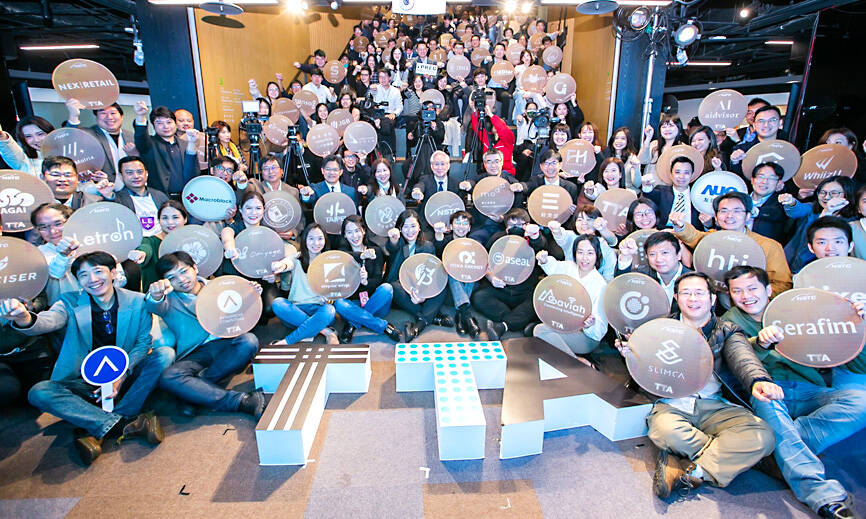The National Science and Technology Council is to lead 96 Taiwanese tech start-ups to the annual Consumer Electronics Show (CES) in Las Vegas, Nevada, from Jan. 7 to 9, the council said yesterday.
It would be Taiwan’s seventh participation at CES as a national team, the council said, adding that it hopes to showcase the nation’s technological strength.
About 28 percent of the group comprise start-ups focusing on research and innovation in artificial intelligence (AI) and robotics, while 20 percent specialize in digital health and 18 percent are devoted to smart cities and sustainability, the council said in a statement following a news conference in Taipei.

Photo courtesy of the National Science and Technology Council
Other start-ups are to display their innovations and technologies related to smart homes, sports and fitness, as well as vehicles and advanced mobility during the CES event, the council said.
In addition, two start-ups from the Taiwan Tech Arena start-up development center have won CES 2024 Innovation Awards, with FaceHeart Corp (鉅怡智慧) earning plaudits for its US Food and Drug Administration-certified video-based health measurement software and TSGC Technologies Inc (鴻躉) getting recognition for its eco-friendly and economical recycling solution for solar panels, it added.
The Taiwan Tech Arena is a platform launched by the Cabinet in 2018 to cultivate tech start-ups by helping them raise funds and engage with local entrepreneurs as well as US and European business incubators. The start-up development center at the Taipei Arena aims to cultivate at least 100 start-ups annually, mainly focused on AI, Internet of Things and software applications.
The council is also to host an international conference — dubbed Semiconductors, Global Trends and Taiwan — on Jan. 8 during the CES expo, with well-known experts and academics in the semiconductor field invited to exchange opinions and foster collaboration, it said.
The council said it would also introduce what it calls the Taiwan Chip-based Industrial Innovation Program (晶片驅動台灣產業創新方案) to participants during the seminar, as the program is crucial to the nation’s technological strength over the next 10 to 20 years and Taiwan aims to be a reliable partner in the global supply chain of the semiconductor industry.
The government has planned to allocate NT$300 billion (US$9.72 billion) for the program’s implementation over the next 10 years, the council said earlier.

Shares in Taiwan closed at a new high yesterday, the first trading day of the new year, as contract chipmaker Taiwan Semiconductor Manufacturing Co (TSMC, 台積電) continued to break records amid an artificial intelligence (AI) boom, dealers said. The TAIEX closed up 386.21 points, or 1.33 percent, at 29,349.81, with turnover totaling NT$648.844 billion (US$20.65 billion). “Judging from a stronger Taiwan dollar against the US dollar, I think foreign institutional investors returned from the holidays and brought funds into the local market,” Concord Securities Co (康和證券) analyst Kerry Huang (黃志祺) said. “Foreign investors just rebuilt their positions with TSMC as their top target,

REVENUE PERFORMANCE: Cloud and network products, and electronic components saw strong increases, while smart consumer electronics and computing products fell Hon Hai Precision Industry Co (鴻海精密) yesterday posted 26.51 percent quarterly growth in revenue for last quarter to NT$2.6 trillion (US$82.44 billion), the strongest on record for the period and above expectations, but the company forecast a slight revenue dip this quarter due to seasonal factors. On an annual basis, revenue last quarter grew 22.07 percent, the company said. Analysts on average estimated about NT$2.4 trillion increase. Hon Hai, which assembles servers for Nvidia Corp and iPhones for Apple Inc, is expanding its capacity in the US, adding artificial intelligence (AI) server production in Wisconsin and Texas, where it operates established campuses. This

US President Donald Trump on Friday blocked US photonics firm HieFo Corp’s US$3 million acquisition of assets in New Jersey-based aerospace and defense specialist Emcore Corp, citing national security and China-related concerns. In an order released by the White House, Trump said HieFo was “controlled by a citizen of the People’s Republic of China” and that its 2024 acquisition of Emcore’s businesses led the US president to believe that it might “take action that threatens to impair the national security of the United States.” The order did not name the person or detail Trump’s concerns. “The Transaction is hereby prohibited,”

Garment maker Makalot Industrial Co (聚陽) yesterday reported lower-than-expected fourth-quarter revenue of NT$7.93 billion (US$251.44 million), down 9.48 percent from NT$8.76 billion a year earlier. On a quarterly basis, revenue fell 10.83 percent from NT$8.89 billion, company data showed. The figure was also lower than market expectations of NT$8.05 billion, according to data compiled by Yuanta Securities Investment and Consulting Co (元大投顧), which had projected NT$8.22 billion. Makalot’s revenue this quarter would likely increase by a mid-teens percentage as the industry is entering its high season, Yuanta said. Overall, Makalot’s revenue last year totaled NT$34.43 billion, down 3.08 percent from its record NT$35.52